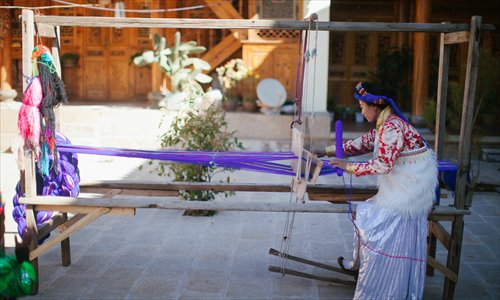
Shougong Geiru Yongqing weaves on a loom at her house. (Photo: Li Hao/GT)
For hundreds of years, the Mosuo people have lived next to Lugu Lake in Lijiang, Southwest China's Yunnan Province in a traditional way, maintaining the only matriarchal society in China. But gradually, their society, which stretches from Yunnan to Sichuan Province, is breaking down as more and more young people choose to leave home and work in the cities. The UN has funded a program to revive their traditional handicrafts and keep the young women from abandoning their way of life, but the program has struggled as hand-woven fabrics have been priced out of the market by machine-woven garments.
Shougong Geiru Yongqing remembers leaning against her grandmother's loom when she was in elementary school and watching the wooden shuttle fly across the fabric. Sometimes her grandmother would start singing in Mosuo.
She started learning how to weave a couple of years later, like most girls in the village. And when she was 13, she wove her first piece of fabric by hand.
The 24-year-old lives in Walabi, a traditional Mosuo village of 70 households in Lijiang, Yunnan Province. The Mosuo people are an ethnic group that live in Southwest China and maintain the only matriarchal society in the country. The Mosuo are a small group, with a population of around 53,000 in a country of 1.3 billion, or 0.004 percent of the total population, according to a report by the United Nations Development Program (UNDP).
When she was young, every household had a loom and women often sat and weaved in their spare time. As tourism developed in the area, their fabrics became popular in nearby cities, turning their traditional arts into a big moneymaker. But nowadays, more and more young people are choosing to work in the cities and their traditional way of life is breaking down.
Staying back home
Shougong only came back to the village in recent years. She started working in the city of Lijiang when she was 13. Her sister had a shop back then that sold scarves and various traditional Mosuo products and her brother had a bar in the city. Since then, she's worked in many jobs. She has waited tables at restaurants and worked in clothes shops.
But her maternal grandfather fell ill a couple of years ago, and at the time her older sister had just had twin girls and couldn't spare any time to take care of the family. Her parents told her to come back to the village and uphold Mosuo traditions.
According to tradition, there needs to be at least one woman living in every household, and women are encouraged to stay home to form the core of the family unit. Shougong has four brothers that are all working away from home, while she and her sister take care of their grandparents and run the household to take over these responsibilities from their aging mother.
The reason for this is that the Mosuo people have a tradition of zouhun (walking marriage), where partners live in different households during the day. The men come over to their wives' houses at night only, and children from these relationships are raised solely by their mothers and mothers' families, and take their mother's family name. Therefore without sufficient women, the Mosuo traditional family structure is not sustainable.
"My parents said there has to be at least one woman at home," Shougong said. "There's no arguing over that point. It's tradition."
Shougong and her older sister are two of the few local young women who stayed back in the village at their parents' insistence. Many young people in recent years have chosen to find jobs outside for a variety of reasons, including wanting to see the world, making more money, or simply being tired of the hardships that come with living in a remote rural village. This act draws disapproval from many village elders.
"They think it's easier to live in the big cities, some wait tables and get 3,000 yuan ($468) a month, it's not that hard," Shougong's father, Wengchong Gaoru said.
Yearning for the outside
Xiong Lamu and her sister are among those who left the village a few years ago to work. In January 2016, her sister will be marrying an ethnic Han (China's majority ethnicity) living in Lijiang, and that will end any possibility of her returning home and living in a traditional way.
Many people have left because it was too hard to make money in Mosuo villages, which are often isolated and located deep inside the mountains. Transportation links there are poor and opportunities rare.
Last month, an airport was finished next to Lugu Lake, making it easier for people in the area to fly to Kunming, capital of Yunnan. A flight leaves the airport every other day. But before that, if people had to get in and out of the village, they needed to take a bus for around 10 hours through the mountains, on muddy roads. However flights are too expensive for most villagers.


















































